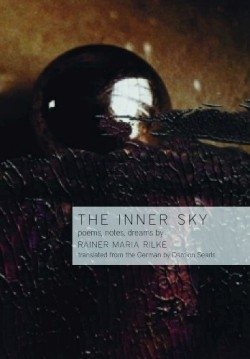The Inner Sky
Poems, Notes, Dreams
In The Inner Sky: Poems, Notes, Dreams, even a Rilke scholar will find new work within this collection of the Ger-man writer’s notebooks and less-published writings. A mix of poems, prose, and unstructured musings, The Inner Sky contains writing outside of Rilke’s extensive, oft-translated canon, but at the caliber of imagination expected from his better-known works. While the more structured pieces—poetry, short fiction—here read more strongly than the fragmented notebook entries, as a whole the collection makes an important contribution to the Rilke already available to an English-speaking readership.
Rilke often takes young women as his subject in these passages, set in the rural landscape and towns of his native Germany. Intrigued by girls’ youthful beauty, he writes of their simultaneous innocence and encroaching maturation. “Even so,” states the speaker in the collected vignettes comprising “Interiors,” “in the small towns and tiny villages of my homeland too the little girls turn into big girls overnight. I cannot prevent it…” Meditations on aging also turn inward in The Inner Sky, as in the fragmented poem “[Come then, come, you last thing].” Untitled and unfinished, the poem marks the last entry in Rilke’s last notebook, written two weeks before his death; it mourns the slow descent of the body into illness and pain. “Pure and aimless,” the speaker states, “free from future, I / have mounted the heaped-up pile of suffering.” Here the reader catches a rare glimpse into the thoughts and fears documented, with prescience and style, by a life near and aware of its end.
Translating Rilke means entering quite an established literary tradition, one that is not lost on translator Damion Searls. Searls dedicates The Inner Sky to poet Anne Carson and previous Rilke translators and well-known literati Stephen Mitchell and Edward Snow. Winner of PEN and Fulbright awards, Searls endeavors to translate with “vigor and mysterious simplicity”; his rendering is as unconventional as it is enjoyable. His English, as he describes it in the collection’s thoughtful afterword, highlights its Germanic ties to Rilke’s “tongue-twistingly assonant” original language, oftentimes with an unusual twist in the English.
No matter their level of familiarity with Rilke, The Inner Sky belongs on the bookshelf of any literature lover, thanks largely to Searls’ deft translation and grouping of Rilke’s work. This nontraditional collection pre-dates prose poetry and short-short fiction, yet speaks to these contemporary styles of new craft.
Disclosure: This article is not an endorsement, but a review. The publisher of this book provided free copies of the book to have their book reviewed by a professional reviewer. No fee was paid by the publisher for this review. Foreword Reviews only recommends books that we love. Foreword Magazine, Inc. is disclosing this in accordance with the Federal Trade Commission’s 16 CFR, Part 255.

